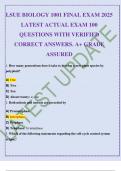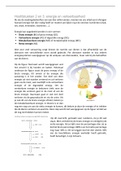Exam (elaborations)
LSUE BIOLOGY 1001 FINAL EXAM 2025 LATEST ACTUAL EXAM 100 QUESTIONS WITH VERIFIED CORRECT ANSWERS. A+ GRADE ASSURED.
- Course
- Institution
LSUE BIOLOGY 1001 FINAL EXAM 2025 LATEST ACTUAL EXAM 100 QUESTIONS WITH VERIFIED CORRECT ANSWERS. A+ GRADE ASSURED.
[Show more]




